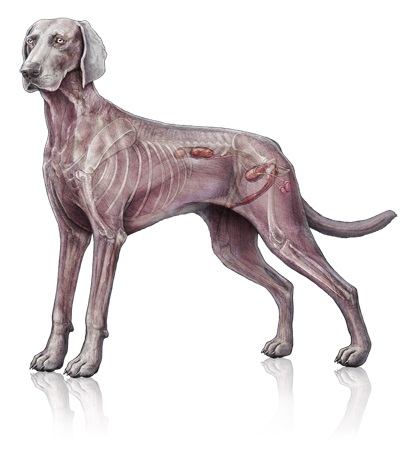Male Urogenital

The urogenital tract includes the urinary tract and the genital tract. The urinary tract consists of
kidney, ureters, urinary bladder, and urethra. Kidneys and ureters form the upper urinary system while the urinary bladder and urethra are included in the lower urinary tract. The function of the upper urinary tract is to filter the metabolic wastes from the blood and excrete them through urine while the lower urinary tract acts as a storage house for urine before it is excreted through the urethra. Kidneys are also responsible for regulating blood pressure, maintain water and electrolyte balance. Any problem in the urinary tract leads to symptoms like excessive urination, straining to urinate, vomiting, blood in urine, lethargy, and incontinence.
The genital system consists of reproductive organs i.e., testicles and prostate. Reproductive organs are responsible for producing hormones that are involved in reproduction.
Genital tract abnormalities result in foul discharge, lethargy, straining to defecate, and urinate.
Commonly occurring urogenital diseases include:
- Urinary tract infection (UTI): Females are more prone to having urinary tract infections as compared to males due to the length of the urethra which is smaller in females. The reason for UTI in male dogs might indicate some underlying conditions like bladder stone, prostatic disease, and impaired immune response.
- Kidney failure: Kidney failure can be acute or chronic. Acute kidney failure is caused by infections, kidney stones, drugs, and toxins. When an ailment persists for a long period, it can lead to chronic renal failure. Chronic renal failure is diagnosed when 2/3rd of the kidneys are already damaged so the reason for this cannot be determined.
- Urinary bladder stones: Stones are formed due to excessive deposition of minerals in the bladder while some are formed due to the presence of some infections.
- Prostatic disease: They are common in male dogs but the chances of their prevalence are less in neutered males. Prostatic diseases include tumors, enlargement of the prostate gland, cysts, and infections. However, the chances of prostate cancer are equal in neutered and no-neutered dogs.
